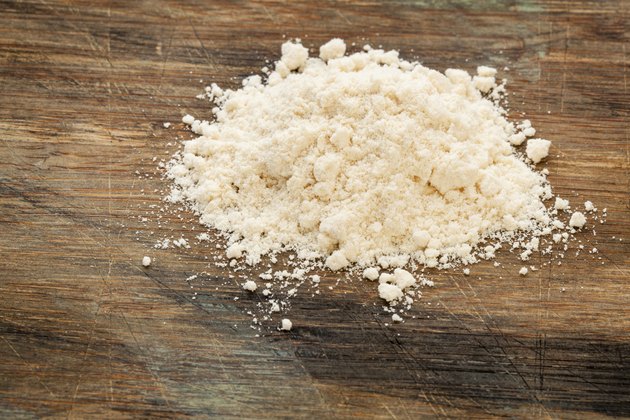
Coconut flour, made from dried, ground coconut meat, is no longer only found on the back shelves of your local health-food store. Due to its numerous health benefits, light coconut flavor and airy texture, coconut flour is making its way into mainstream stores and recipes. Use coconut flour in baked goods for a lower-carb, high-fiber and gluten-free alternative to wheat flour.
谷蛋白和小麦
Coconut flour is a gluten-free alternative to wheat flour. Gluten is a protein found in wheat, barley and rye -- making traditional breads and baked goods off-limits for people sensitive to the stuff. Coconut flour enables you to bake some of your favorite cookies, pancakes and cakes without the serious side effects that may come from ingesting wheat. Coconut flour does act differently in batters than traditional grain flours, though, so you'll need to seek out recipes that adjust the other recipe ingredients accordingly.
High in Fiber
With 5 grams of fiber per tablespoon, coconut flour has far more of this indigestible carbohydrate than whole-grain flour, which has 0.8 gram per tablespoon, or white flour, which has just 0.2 gram per tablespoon. Much of this fiber is the insoluble type, which adds bulk to your stool, helps you feel full, deters constipation and enhances colon health. Add coconut flour to baked goods, sauces or smoothies to help you reach the recommended 25 to 38 grams of fiber daily.
Moderate Effect on Blood Sugar
Due to the high-fiber content, coconut flour doesn't spike your blood sugar as quickly as grain-based flours. A study published in the "British Journal of Nutrition" in 2003 found that substituting coconut flour for some of the wheat flour in traditional baked goods lowers the glycemic index -- the measure of a food's impact on blood sugar -- of the finished product. This moderate blood-sugar effect could be a positive for diabetics who need to carefully control their blood sugar. A later study published in a 2006 issue of "Innovative Food Science & Emerging Technologies" confirmed these findings.
Higher Protein and Healthy Fats
Coconut flour also contains a significant amount of protein, especially when compared to wheat flour. A 100-gram serving of coconut flour has 19 grams of protein while wheat flour has just 10. Although this protein doesn't contain all the essential amino acids, it does contribute to your total daily protein intake to help with cell repair and growth. Coconut flour also contains about 9 grams of healthy fats per 100 grams. Although these fats are mostly saturated, they're a type called medium-chain triglycerides, which digest easily; provide instant energy; offer antiviral, antimicrobial and antifungal properties; and may boost your metabolism.